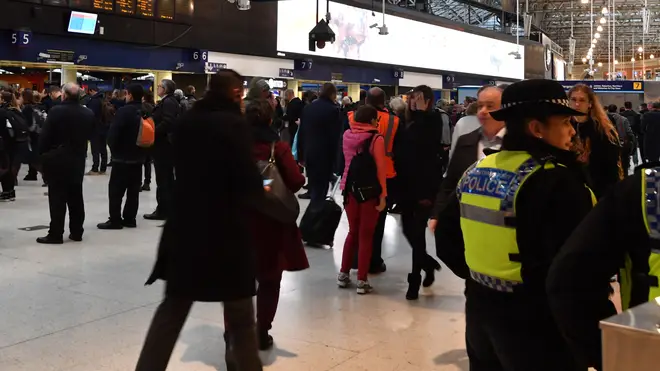
Ian Payne 4am - 7am
5 September 2019, 10:17

Crime on Britain's railways has risen by more than 12 per cent over the past year, according to British Transport police figures.
Homicides, assaults, sexual offences, drugs offences, robberies, racially or religiously aggravated public disorder offences and offences of violence involving firearms or explosives are among the crimes that have increased on trains and at stations across England, Scotland and Wales
The figures released by British Transport Police (BTP) show that crimes have increased from 60,867 in 2017/18 to 68,313 in 2018/19.
Theft of passengers' property is the most common offence - accounting for 23% of crimes - closely followed by violent crimes.
Offences of violence, which included six homicides, 14 attempted murders, 3,047 serious assaults and 8,207 assaults, rose by more than 16%.
Sexual crimes were up by nearly 8%, with 1,584 offences against women and 113 against men.
Thefts of passenger property increased by 20.58% and robberies by 32.53%.
The figures also show that public disorder rose by 8.55%, with 7,993 reported cases of causing fear, alarm or distress and another 2,231 offences that were racially or religiously aggravated.
The highest number of crimes were recorded in BTP's B Division North - which covers an area including north London and East Anglia - while the fewest crimes were recorded in Scotland, the only area to show an overall decrease.
Wales showed the highest rise in offences of violence against the person, sexual offences, motor vehicle or cycle offences and fraud; the South West saw the biggest increases in criminal damage, "route" offences and robbery; and the Midlands showed the largest increase in public disorder and drugs offences.
The two areas covering London and the South East showed the biggest rise in theft of passenger and railway property.
The only crimes to show an overall decrease since last year were those classed as "line of route", which include offences of destroying, damaging or endangering safety, obstruction and throwing missiles at rail vehicles.
BTP said the increase in reported crime was linked to record numbers using the railway and stations becoming commercial environments, offering shopping, entertainment and nightlife.
A spokesman said the figures showed that becoming a victim of serious or violent crime on the British rail network is rare, with less than one serious violence or sexual crime per million passenger journeys.
The number of overall crimes per million journeys made has also fallen since 2009/10, from 25.6 to 20.8 in 2018/19.
Deputy Chief Constable Adrian Hanstock said: "Like forces throughout Britain, we have seen an increase in notifiable crime within the national network.
"With record levels of passengers using the railway, we anticipated there could be a subsequent rise in crime.
"As stations become increasingly commercial environments, a large proportion of this increase is as a result of theft of passenger property, anti-social behaviour or shoplifting.
"Despite this increase, when put into context, it is important to remember that the chance of becoming a victim of crime on the railway is very low.
"We now police more than 3.3 billion journeys each year, the equivalent of a third of the world's population passing through our jurisdiction.
"Of course, any rise in crime is of concern to us and we are tackling this head-on through our problem-solving initiatives at key locations."
Mr Hanstock said preventing serious violence and knife crime is one of the highest priorities for BTP and that half of all knife crime recorded last year was a result of officers seizing weapons before a crime could be committed.
Drugs offences rose by 52.96% but Mr Hanstock said the force was involved in tackling county lines drugs trafficking and had dedicated teams working on the problem in collaboration with other law enforcement agencies, leading to large quantities of drugs being seized and arrests being made.
Mr Hanstock added that BTP had seen a large increase in demand in relation to vulnerable people and officers and rail staff had helped to save 2,529 lives last year as a result of their interventions.
Other achievements for the force include reducing trespass incidents at hotspot locations and trespass by children and young people, and the introduction of a neighbourhood policing strategy, which has seen a reduction in retail crime and an increase in detection rates at Birmingham New Street station.